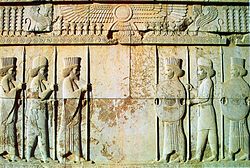"
Now when the apostles at Jerusalem heard that Samaria had received the word of God, they sent to them Peter and John, who came down and prayed for them that they might receive the Holy Spirit, for he had not yet fallen on any of them, but they had only been baptized in the name of the Lord Jesus. Then they laid their hands on them and they received the Holy Spirit."
- Acts 8:14-17
This is a very difficult passage. We see some events following the visit of
Philip to Samaria, as Jesus had commanded (Acts 1:8). As a result of his visit, a number of people are converted. This man was one of the seven appointed as deacons in chapter 6, men who are explicitly described as "full of the Holy Spirit and of wisdom" (Acts 6:3). When they received news of this work of God among the Samaritans (compare John 4:39-42 and Matthew 10:5-6), the Apostles sent Peter and John to examine the situation there. We are told that Philip had baptized the Samaritans "
only in the name of the Lord Jesus" (8:16), yet they had not received the Holy Spirit.
As Oneness Pentecostals love to point out, all of the baptisms in Acts are done in some variation of the name of Jesus. We do not see the Trinitarian formula of Matthew 28:19. The significance of that is merely that the Apostles have undertaken the authority that Jesus gave them, an important consideration now that the Lord was no longer physically among them. However, this is the only occasion where Luke refers to it as
only the name of Jesus, or gives it any negative consequences.
The answer is actually pretty simple.
Acts is a book of transitions. In it, Luke describes the transition from the direct authority of Jesus to that of the Apostles and elders and of the change from a predominantly-Jewish Church to a predominantly-gentile Church. The first is the reason for the extraordinary signs we see in chapter 2; the latter is what we see here in chapter 8. Luke gives us some out-of-sorts events, not to say anything about baptism, but rather to show the Holy Spirit's sign to the Apostles that the Gentiles were coming in. This lesson took some work, as we can see, because it isn't until chapter 11 that they get the point: "
[The Apostles] glorified God, saying, 'Then to the Gentiles also God has granted repentance that leads to life.'" (Acts 11:18).
This passage is a problem, however, for the Oneness Pentecostals. On the basis of their bizarre interpretation of Acts 2:38, their doctrine of salvation is that profession, baptism (in Jesus's name
only), and "the baptism of the Holy Ghost," which necessarily includes speaking in tongues, all must occur, and in that order. Yet, baptism, supposedly in the form these people enjoin, left its recipients with no Holy Spirit. While I understand that this was as a sign to the Apostles, it is devastating to Oneness doctrine, because it disconnects the events required in their soteriology!
The error of the Oneness theology is that it assumes that what is temporary, i. e., for a specific purpose, is to be normative for all times. Yet, if baptism in Jesus's name only and speaking in tongues are essential for salvation, are the Apostles not to be rebuked for their failure to say any such thing in any of their epistles? Of course they are! But that actually demonstrates the difference between the historical emphasis in Acts from the doctrinal explanation that is central to the epistles. Oneness theology fails to distinguish between what happens under particular circumstances and that which was intended to be eternal.
And this isn't simply a
mistake. I fellowship with Christians who are
mistaken all the time. However, a false doctrine of salvation is a dividing line. I must reject as a brother, and, in fact, oppose as an enemy, anyone who denies salvation by grace through faith alone (Ephesians 2:8-9) because he is throwing a stumblingblock between sinners and their only Savior Jesus Christ.
This is the biblical doctrine of salvation: "
We hold that one is justified by faith apart from works" (Romans 3:28). No works of men stand between the sinner and salvation in Jesus Christ, including ceremonies like baptism or speaking unknown languages. The Prophet Isaiah said that God offers salvation "without money and without price" (Isaiah 55:1), but the Oneness cult tries to set up a toll road and demand fees before the sinner can come to Christ. That makes them a foe, and I must oppose them.









